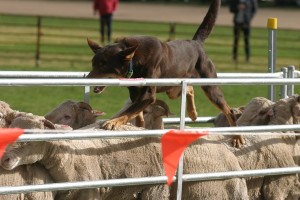MANY working dog traits valued by breeders and livestock producers are strongly heritable, new research has found.
A study funded by the Rural Industries Research and Development Corporation (RIRDC) and Meat and Livestock Australia (MLA), and carried out by veterinary researchers at the University of Sydney has, for the first time, identified and mapped the genetic traits that will improve the accuracy of breeding high performing working dogs.
For many years Australia’s livestock industries have used genetic traits to breed better sheep and cattle, and now Australia’s farmers are set to do the same thing to breed better working dogs.
The study’s lead researcher, Professor Paul McGreevy from the University of Sydney, said the research has paved the way for a robust and objective system of selection and breeding to be developed and put in place.
“Despite widespread acknowledgment of the important contribution the Australian livestock working dog makes to livestock industries and the rural economy, many aspects that influence dog performance and breeding and selection success have not been previously quantified, and a lot were anecdotal.
“To optimise dog performance and success rates, and thus minimise so-called wastage, this research was required to provide evidence-based information to those who breed, train, handle, work and trial livestock working dogs,” Professor McGreevy said.
“Optimising dog performance requires that we understand husbandry, training and management techniques.
“This study did that by revealing management factors and handler attributes that relate to the success of dogs in the workplace.”
The study has not only contributed much new information about Kelpies, their special qualities and how to get the best of out of them, but has also put in place a process for assessing dogs’ performance and breeding potential. This has laid a strong foundation for ongoing research and development that will continue to deliver ever more detailed information to stakeholders.
DNA analysis showed gene-behaviour association
Researchers on the project used DNA analysis to reveal some gene-behaviour associations and calculated heritability estimates that could underpin a database for potential estimated breeding value (EBV) calculations. EBVs are well-established and widely used in livestock industries.
The research showed that many of the traits that working dog breeders and handlers value, such as trainability and boldness with stock, have strongly inherited components. These heritability estimates indicate the expected effectiveness of a selective breeding program and can be used to generate EBVs. This approach will help breeders to better select breeding dogs and identify kennels that have similar breeding goals to their own.
Calmness, intelligence, patience and trainability head list
The study discovered that the traits that cluster most strongly together in working dogs are intelligence, calmness, patience and trainability.
In addition to the identification of key genetic traits, the study also calculated an estimation of the economic worth of the working dog, and this revealed a five-fold return on investment.
The dogs’ economic worth was calculated by estimating the costs associated with acquiring, training and maintaining them, and an estimate of the work they typically perform over a lifetime.
Up until now the economic worth of working dogs had never been calculated and objective measures of desirable genetic traits had been unavailable, denying working dog owners the opportunity to make breeding decisions based on comprehensive, standardised and objective data.
Information collected on more than 4000 dogs
As part of the study, information was collected from over 800 dog owners relating to more than 4000 dogs. The Farm Dog Survey, conducted in 2013, was used to gather this information and it included questions about working dog usage and management factors, as well as the characteristics of dog owners and handlers. The pedigrees of over 80,000 working Kelpies were also analysed.
The study has identified the working behaviours of most value to farmers, and found that owners were generally good assessors of the ability of their own dogs’ core attributes. Valuable information relating to how hard farm dogs work during peak periods, such as shearing, was also obtained. Preliminary results suggest that yard trial scores reflect important aspects of work performance, are useful in understanding dog’s efficiency in yard work, and suggest that high-scoring dogs may actually cause less stress to sheep.
The study also identified important management factors and handler attributes that influence the success of dogs in the workplace. Significant associations were identified between success rate and seven variables: dog breed; housing method; trial participation; age of the dog at acquisition; electric collar use; hypothetical maximum treatment expenditure; and the conscientiousness score of an owner’s personality. These findings serve to emphasise the impact of the handler on a dog’s working success and should inform extension programs that emerge from the study. One of these examples from the study was that electric collar use was associated with poor outcomes in the workplace.
The study calculated that working dogs typically work for five hours a day, five days a week during the peak period of shearing. It also revealed that they typically travel over 40km per day and reach maximum speeds of 37km per hour.
The project was provided valuable in-kind support from the Working Kelpie Council of Australia.
The comprehensive research report, ‘Valuable behavioural phenotypes in Australian farm dogs’ can be downloaded for free from the RIRDC website:https://rirdc.infoservices.com.au/items/15-081
Source: RIRDC


HAVE YOUR SAY